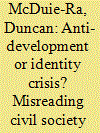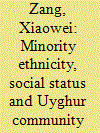| Srl | Item |
| 1 |
ID:
079632


|
|
|
|
|
| Publication |
2007.
|
| Summary/Abstract |
This paper discusses the complex relationship between civil society and development in Asia by examining the role of ethnic identity in anti-development movements. Local and transnational movements by civil society actors against dams, mines, and deforestation have gained increased attention in academia and activist circles in the last decade, often used as evidence in arguments that development as part of neo-liberalism and/or state-led socialism is faltering. Furthermore, tribal, indigenous, and minority communities are often portrayed as having a closer relationship to the environment, which is seen as instrumental in their opposition to development projects. While agreeing with these arguments to some extent, this paper examines the local context of anti-development movements using research from fieldwork in the Indian state of Meghalaya and argues that struggles over development projects are also struggles over ethnic identity. In Meghalaya, civil society actors from the Khasi ethnic group have opposed several large development projects on the +grounds that these projects will attract labourers from Bangladesh and other parts of India, threatening the survival of the Khasi ethnic group. Damage to the environment, livelihoods, and loss of land are rarely a concern. The failure to recognize the influence of ethnic identity politics in critiques of development raises the risk of misreading both the extent of anti-development sentiments in civil society and the potential for development projects to be reframed by proponents into an acceptable ethnic guise. Furthermore, the actors contesting development through identity politics are overwhelmingly from urban areas, leaving rural people with limited access to civil society. This paper attempts to add a critical perspective to current literature on development and civil society using empirical examples from one of the least researched regions in Asia
|
|
|
|
|
|
|
|
|
|
|
|
|
|
|
|
| 2 |
ID:
079630


|
|
|
|
|
| Publication |
2007.
|
| Summary/Abstract |
Korean ethnic education in Japanese public schools has played an important role in the persistence of Korean ethnicity in Japan. In Osaka Prefecture, it began as an educational movement at the end of the 1960s. Japanese and Korean activists who led the movement had different political commitments and developed two approaches. Those interested in Korean homeland politics stressed the importance of teaching the ethnic culture of the homeland and tried to develop an ethno-national identity among Korean children. Those involved in civil rights politics in the context of Japan focused on the problem of ethnic discrimination and facilitated the formation of a political subjectivity among Korean children. The old practice of Korean ethnic education is a form of multicultural education and provides many useful ideas for today's multiculturalist teachers in Japan, who are dealing with children of newcomer foreigners.
|
|
|
|
|
|
|
|
|
|
|
|
|
|
|
|
| 3 |
ID:
079631


|
|
|
|
|
| Publication |
2007.
|
| Summary/Abstract |
Using a dataset (n = 4,012) from a 2001 survey in Xinjiang, I examine the effect of minority status and social status on neighbouring behaviour in urban China. Data analysis indicates that Uyghur Muslims are more neighbouring than Han Chinese. However, there is no evidence that the Uyghur approach to neighbourhood interaction can be attributed to Uyghur culture as many inter-group differences fade away once ethnic parity in social status is attained. I use my study to consider some methodological approaches used in research on ethnic behaviour in China.
|
|
|
|
|
|
|
|
|
|
|
|
|
|
|
|